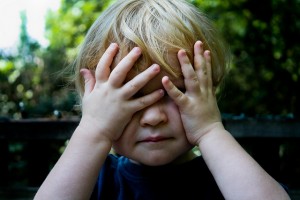
“Blinding” means that patients in a trial don’t know if they’re receiving the treatment or are part of the control group (“double blind” would mean that those giving the treatment also don’t know.)
The rationale for blinding is that people who know they are getting the treatment may have positive expectations for it to work and get better because they think they will (the placebo effect) rather than because the treatment itself is effective.
The placebo effect itself is an astonishing thing. For a bite size introduction, watch this NHS Choices video of Ben Goldacre.
In line with this, randomised trials that don’t use blinding tend to show larger treatment effects than blinded studies. Lack of blinding therefore means we risk over-estimating the effectiveness of a treatment.
In trials of psychological therapy, we’re unable to blind the patients and the therapists to whether they’re giving and receiving the ‘real’ treatment. With antidepressant medication however, it is possible to give some participants a placebo medication (sugar pill) and so they don’t know whether or not they are getting the real drug, which controls for the potentially inflating impact of expectations.
The research group behind a recent meta-analysis (led by Pim Cuijpers) has published previous meta-analyses showing no significant difference between psychotherapy and medication for treatment of depression. Here, they ask whether the fact that medication can be blinded whereas psychotherapy can’t means that the effect of psychotherapy comparative to medication is over-estimated.

Are unblinded psychotherapy trials over-estimating the benefits of talking therapies?
Methods
- The team included RCTs where psychological treatment was directly compared to antidepressants in adults with depressive disorder
- 35 studies were included in the final analysis. Nine of these used a placebo control condition
- Six of the studies compared different kinds of psychotherapy, so there was a final pool of 41 comparisons of psychotherapy to medication across the 35 studies. 10 of those 41 were comparisons with placebo, so comparisons where the medication arm was blinded
- Studies were assessed for risk of bias using the Cochrane Collaboration tool.
Results
Consistent with previous meta-analyses, there was no overall significant difference between psychotherapy and antidepressants when they looked at all the studies together.
When they pulled out the comparisons with no blinding, they found that medication had a small but significantly better impact than psychotherapy. When they analysed the studies which blinded the medication arm, they found that there was no difference between the two. The team describe this as ‘consistent with their hypothesis’.
Being an elf of little brain, I got somewhat confused at this point. Given the talk in the paper’s introduction of inflating the effect of psychotherapy and under-estimating the effect of medication, this finding seems the wrong way round. I anticipated that the non-blinded studies which risk ‘inflating’ the effect of psychotherapy would show that psychotherapy was superior, and the difference disappears on the blinded studies.
The authors are consistent though, if you follow the line of argument that the blinded studies are showing us the ‘true’ effect of medication, which in this case is that it’s not significantly better than therapy. The finding from the non-blinded studies where medication comes out better is the result of the placebo effect inflating the impact of medication.
The argument would be that this means there is an inflation effect that happens in non-blinded studies, and so we should assume psychotherapy is also being inflated. In the studies which show no significant difference, we can only blind the medication arm, the implication being that the psychotherapy arm effect is likely being inflated (and might be less effective if we could pull out the ‘true’ effect).
This hinges though on the placebo effect (a still quite mysterious and complex concept) being consistent in the way it operates across therapy and medication and of a similar power. Even this is an entirely indirect way of inferring what the impact of placebo on psychotherapy may be (which the authors themselves acknowledge in the limitations section.)

Studies in which no placebo condition was included, resulted in a small but significant difference in favour of pharmacotherapy.
Conclusions
Even if we do take their line of argument at face value, the authors themselves say:
The effect sizes found in this paper are all very small and probably can not be considered to be clinically relevant.
It’s a bit of a damp squib of an ending, which is no comment on the quality of the study conducted, but I am struggling to say what this usefully adds.
Perhaps more interesting would be a discussion about whether we could find a way to mask psychotherapies in trials or whether we just have to accept that blinding isn’t possible. I know from my experience on trials that participants will talk about ‘the therapy’ in quite broad terms and they might not know, for example, if they were getting “active” cognitive behavioural therapy compared to just some cognitive exercises, which could be the ‘placebo’ in this kind of trial.
What we can certainly do is blind outcome assessors (the people collecting the response data) in such trials, and it would be useful to know if this significantly impacts results, as this is something we can then act on in terms of trial delivery and design.
Limitations
- The effect size is very small, run on a very small pool of comparisons, and the implications for the impact on psychotherapy are entirely indirect
- The quality of included studies also wasn’t great
- Another angle completely on this issue would be to question whether we’re correct to talk about a psychosocial intervention like therapy in terms of blinding. The impact of expectations, increased hope, trust in the treatment, could be seen as part and parcel of why and how an intervention like therapy works on a psychological illness such as depression, rather than being noise that disrupts our view of the ‘real’ effect.

Is it possible to blind patients from the psychotherapy they are receiving?
Links
Primary paper
Cuijpers P, Karyotaki E, Andersson G, Li J, Mergl R, Hegerl U. (2015) The effects of blinding on the outcomes of psychotherapy and pharmacotherapy for adult depression: A meta-analysis. Eur Psychiatry. 2015 Sep;30(6):685-93. doi: 10.1016/j.eurpsy.2015.06.005. Epub 2015 Jul 11.

Does the placebo effect inflate the effectiveness of psychotherapy? https://t.co/tSHEILRRXQ #MentalHealth https://t.co/RgifoNJs54
Today @dr_know considers effects of blinding on outcomes of psychotherapy & pharmacotherapy for depression https://t.co/VxuFuQbc23
@Mental_Elf @dr_know not a significant difference then
@ha97lw @Mental_Elf I think “we don’t really know” would be most accurate conclusion as this is such indirect way of assessing it.
@Mental_Elf @dr_know this is a finding I observe reading RCTs of CBT – there is also a ‘coaching element to CBT’ goes beyond placebo effect
@Mental_Elf @dr_know only blinding assessors does little to mediate this bias: we must try blinded studies, a “fake CBT” would be the way
@Mental_Elf @dr_know in studies eh a recent Oxford study of CBT in depression, secondary outcomes show impact of treatment less than claimed
Does placebo effect inflate the effectiveness of psychotherapy? https://t.co/VIyaVvBDWc
Meta-analyses show no significant difference btwn psychotherapy & medication for depression. Is it that simple? https://t.co/VxuFuQbc23
@Mental_Elf but most people would rather not take medication. Learning coping strategies and triggers can provide autonomy.
Does the placebo effect inflate the effectiveness of psychotherapy? https://t.co/CjikK9PDxK via @sharethis
Does the #placebo effect inflate the #effectiveness of #psychotherapy? https://t.co/a3s2yWZUoR @Mental_Elf looks at a #metaanalysis
Subjective effects = placebo effects. Discuss… https://t.co/zTacJCgBFZ @Mental_Elf
Does the placebo effect inflate the effectiveness of psychotherapy? https://t.co/cgRcbxb8zN
Are unblinded psychotherapy trials over-estimating the benefits of talking therapies? https://t.co/VxuFuQbc23
This is no surprise to me – I’ve long said that without blinding results from RCTs are unreliable in general https://t.co/Jr3a5ywizM
[…] 1Does placebo effect inflate the effectiveness of psychotherapy? -Mental Elf Blog post. […]
RT @Mental_Elf: Is it possible to blind patients from the psychotherapy they are receiving? https://t.co/VxuFuQbc23
Don’t miss: Does the placebo effect inflate the effectiveness of psychotherapy for depression? https://t.co/VxuFuQbc23 #EBP
@Mental_Elf inc hope…trust in treatment, cld be part of why therapy works for psychological illness. True of medication too? No bad thing?
What an interesting consideration of this paper, really thought provoking, thank you
But I would like a treatment that works, even if partly by placebo effect “@Mental_Elf: placebo … psychotherapy https://t.co/2Q8VvnaK9q“
Ensayos Clínicos: El Efecto Placebo puede hacer sobreestimar la efectividad de las psicoterapias: https://t.co/sXcsu6HTFs vía @sharethis
Assessed under similar conditions antidepressants are superior to psychotherapy https://t.co/mr0EN8W9l4
If both antidepressants & psychotherapy assessed in non-blind studies then antidepressants are superior via @dr_know https://t.co/mr0EN8W9l4
Does the placebo effect inflate the effectiveness of psychotherapy? https://t.co/d8qUOhvH6j via @sharethis
Does placebo effect inflate the effectiveness of psychotherapy? https://t.co/1qKYRwu1kw
Does placebo effect inflate the effectiveness of psychotherapy? https://t.co/nYNUNMURIs
Does the placebo effect inflate the effectiveness of psychotherapy? https://t.co/iCDPtlqfgi via @sharethis
[…] tiden også blitt stilt spørsmålstegn ved effekten av psykoterapi. Vår britiske søsterblogg Mental Elf kommenterer en artikkel publisert i European Psychiatry i fjor om betydningen av blinding i forsøk med […]